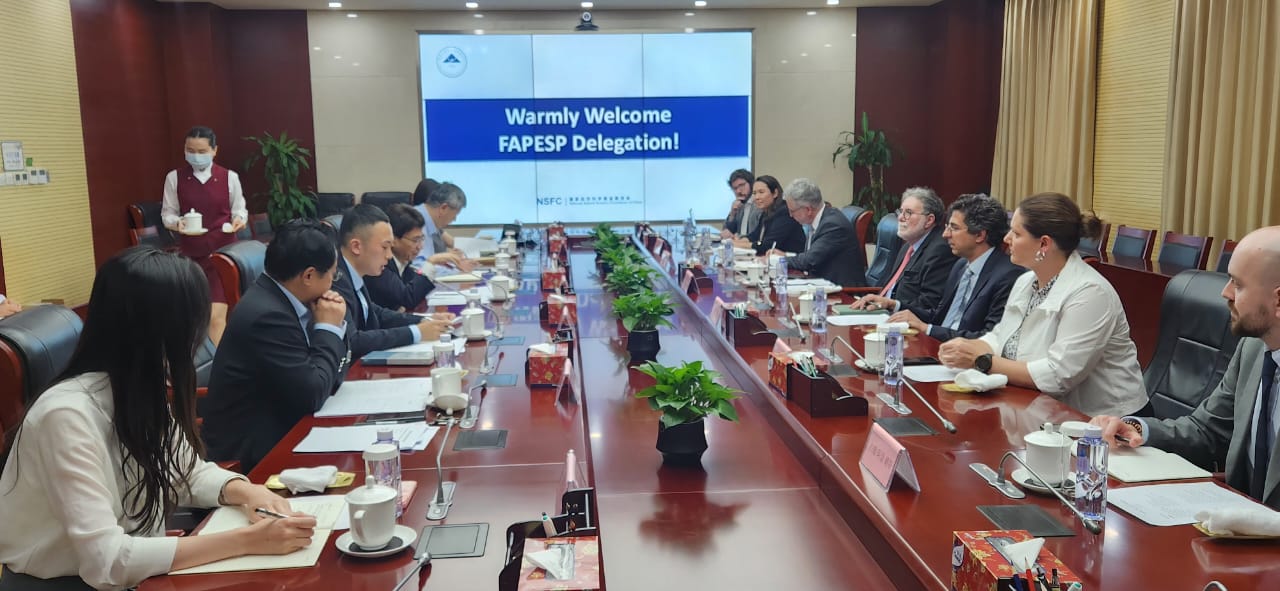


The meeting took place at the NSFC headquarters in the Chinese capital, Beijing (photo: Karina Toledo/Agência FAPESP)
Published on 06/25/2024
By Karina Toledo, from Beijing | Agência FAPESP – On June 24, FAPESP renewed the scientific and technological cooperation agreement it has had with the National Natural Science Foundation of China (NSFC) since 2019. The partnership, which has been extended for another five years, allows for the joint funding of research projects developed by scientists from the state of São Paulo and Chinese colleagues in areas of common interest.
So far, a joint call for proposals has been launched with a focus on combating climate change (read more at: agencia.fapesp.br/37618). A new call for proposals is currently being discussed, this time to support collaborative projects in the field of precision agriculture.
The meeting between the heads of the two agencies took place at the NSFC headquarters in the Chinese capital, Beijing. The FAPESP delegation was welcomed by the organization’s vice president, Lan Yujie, who stressed the importance of international cooperation for his country.
“In 2023, President Xi Jinping met with President Lula and announced a new era of collaboration with Brazil,” Yujie recalled. “FAPESP has become one of the NSFC’s most important partners in Latin America, and this partnership is now five years old. Science is our common language, and it’s my sincere wish that with the renewal of our agreement, we’ll continue to expand our cooperation, incorporating new areas – including biodiversity and oceanography – and increasing investments,” he added.
Carlos Américo Pacheco, executive director of FAPESP’s Executive Board, said that there are many opportunities to be explored in areas such as agriculture and climate change, but also emphasized the Foundation’s interest in areas such as health, the Amazon, and artificial intelligence. “We fully agree with the idea that science is our common language and that science diplomacy is important for relations between countries,” he said.
Pacheco also emphasized that FAPESP and the NSFC work in a similar way when it comes to evaluating projects and the decision-making process, which facilitates interaction between the agencies. In addition, in recent years, both organizations have sought to increase support for young researchers and women scientists in order to promote gender equality in science.
“São Paulo is a small part of Brazil, but it accounts for around 40% of the national scientific production and almost a third of Brazil’s GDP [gross domestic product]. We’re not a scientific powerhouse like China, but we’re very proud of the role we play in the context of Brazil and Latin America,” emphasized Pacheco.
Fostering innovation
FAPESP’s scientific director, Marcio de Castro Silva Filho, who was also present at the meeting with leaders of the NSFC, emphasized that in addition to basic and applied research, the Foundation is dedicated to fostering innovation, and therefore one of the possibilities to be explored in the coming years is the collaboration between companies from the state of São Paulo and China.
This discussion should take shape in the next few days during the 2nd edition of FAPESP Week China, organized in partnership with the China-Lac Technology Transfer Center (CLTTC). The event will take place this Friday (June 28) and Saturday (June 29) in the cities of Shenzhen and Dongguan, as part of the program of the “Conference on Technology Exchange and Development of China-Latin America Cooperation.” The meeting will be an opportunity to celebrate 50 years of diplomatic relations between China and Brazil, the 10th anniversary of the first FAPESP Week China (held in Beijing) and the 1st anniversary of the CLTTC.
As well as researchers working in areas such as precision agriculture, biomedicine, aerospace, green carbon, ESG (a term that refers to actions that demonstrate how companies address environmental, social and governance issues), new materials, smart manufacturing, global governance, field studies and public policy, the Brazilian delegation includes representatives from companies supported by the FAPESP Innovative Research in Small Businesses Program (PIPE). All the Brazilians will participate in visits to important Chinese companies based in the region, such as the electric car manufacturer BYD and BGI, which works in the field of genomics.
Saturday’s program includes a workshop on precision agriculture, organized with the support of the NSFC. Discussions between Brazilian and Chinese researchers during the event will help define the scope of the joint call for proposals that will be launched shortly.
In addition to Pacheco and Castro e Silva, the meeting with NSFC leaders was attended by Eduardo Zancul, advisor to the Scientific Directorate for Innovation; Patrícia Tedeschi, FAPESP’s innovation manager; Ana Paula Yokosawa, deputy manager for Research Cooperation; Rafael Andery, executive secretary of the Amazon+10 Initiative; and João Arthur Reis, advisor to the Presidency for the Amazon+10 Initiative.
For the NSFC, in addition to Lan Yujie, the following participated: Yao Yupeng, deputy director of the Department of Earth Sciences; Zhang Yongtao, director-general of the Office of International Cooperation; Chen Jing, director of the Division for America and Oceania of the Office of International Cooperation; and Tang Rongda and Luo Jingyu, both members of the Division for America and Oceania of the Office of International Cooperation.
For more information about FAPESP Week China, visit fapesp.br/week/2024/china.
Source: https://agencia.fapesp.br/52047